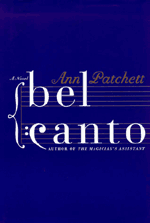|
Ransom of the Opera
When I hear Dvorák's "Song to the Moon" from Rusalka I nearly believe I can fly. To experience Beverly Sills singing "Mariettas Lied" from Korngold's Die Tode Stadt fills me with an indescribable longing. Music like this brings feelings of "other-worldliness," the idea that a place exists where harsh reality is shut out and quiet beauty rules, even in the most unusual of story lines. Ann Patchett's lovely novel Bel Canto (HarperCollins, 2001) is filled with just this kind of magic. The book's heroine, lyric soprano Roxane Coss, is gorgeous, kind, and has been given a gift from the angels—the world's most beautiful singing voice.
All who meet Roxane are drawn to her and her magical singing. She tames the wild beasts (in this case, terrorists) with Puccini and soothes the weary and downtrodden (a houseful of hostages) with Dvorák. She's perfect. Yet we still like her. Cut to the premise of Bel Canto: In an unnamed South American country, a party is held at the home of the vice president. A wealthy Japanese businessman, Mr. Hosokawa, is invited in hopes he will help revive the nation's failing economy. His favorite opera singer performs at the party. When terrorists burst through the air-conditioning vents on a mission to capture the president (who isn't at the party, but at home watching his favorite soap opera), they unexpectedly have a mansion full of party guests on their hands. The confused terrorists keep most of the men and Roxane hostage. Weeks go by, Roxane sings, love blooms, and we get to spy on a lively cast of characters including the quietly brilliant translator Gen Watanabe; Simon Thibault, the French ambassador called upon to cook eggplant; and the shy terrorist Carmen—all of whom learn much about themselves during the ordeal. Life inside the compound becomes more desirable for them than the real world outside as they discover music, cooking, languages, chess, and their own hidden desires. We find that these hostages and their captors are funny, sweet, vulnerable people who become forever changed—elevated—by this experience and by Roxane's glorious singing. Seem implausible? Sound like Survivor meets The Piano? Of course it is, and it does. But the care, beauty, and humor in Ann Patchett's writing make us buy it all. The paragraphs that describe Mr. Hosokawa's and the kindly priest Father Arguedas' love for opera are beautiful—like the music itself. And as in opera, the story is the vehicle for the music within it. At the beginning of Bel Canto we know how it will all end. But that does not stop us from listening to every note of music and hoping that the characters will make it to the grand finale. Leslie Crane is associate producer of MPR's national music programs. Go to MPR Books |
|
MPR Home | News | Music Collection | Events | Radio Listening | Your Voice | About Us | Support Us | Help ©2005 Minnesota Public Radio | Terms of Use | Privacy Policy |
